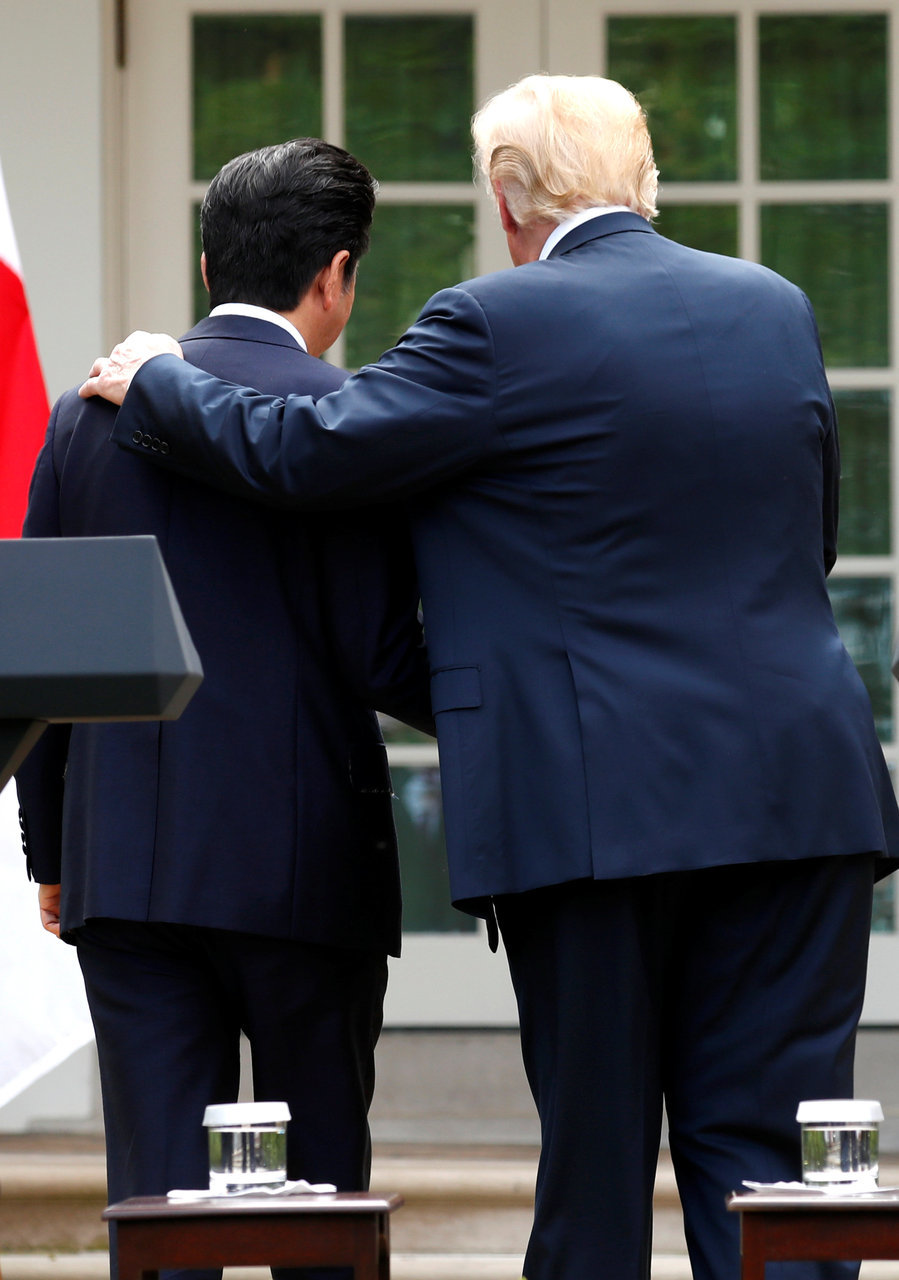 |
|
US President Donald Trump (right) and Japanese Prime Minister Shinzo Abe prepare for a joint press conference at the White House on June 7. (Reuters)
|
Reports of US president’s remarks raises questions regarding Japan’s US-friendly strategy
An American media report stating that US President Donald Trump told Japanese Prime Minister Shinzo Abe that “I remember Pearl Harbor” is creating a scandal in Japan. This is raising questions about whether Abe’s strategy of cultivating a friendly relationship with Trump with the hope that he will choose policies that are favorable to Japan has not been working and in fact has only invited more abuse. Trump and Abe “are on good terms,” Japanese Foreign Minister Taro Kono said during a lecture in Tokyo on Aug. 29. “Personal relationships are important in diplomacy. They’ve spoken on the phone 26 times, sometimes as long as an hour.” Kono’s remarks followed a report printed in the Washington Post the day before claiming that Trump had brought up Japan’s sneak attack on Pearl Harbor on Dec. 7, 1941 (Dec. 8 in Japan), the incident that triggered the War in the Pacific, during a summit with Abe in the White House on June 7. During a press conference on Aug. 30, Japan’s Chief Cabinet Secretary Yoshihide Suga, who serves as a spokesperson for the Japanese government, said that the Pearl Harbor comment mentioned in the Washington Post report had never happened. Since Suga has often made untrue remarks about sensitive foreign policy and security issues, some think that he’s merely feigning innocence about remarks that have roiled Japan. Harsh contrast between Obama and Trump and Japan’s obeisance What’s notable about the Washington Post report is that it belies the Japanese government’s claims that the US-Japan relationship is on a firm foundation and vividly illustrates how Trump’s “America First” policy is placing a considerable amount of stress on the Japanese government, the US’s most important ally in the Asia-Pacific region. While Barack Obama was in the White House, it was relatively smooth sailing for the Japanese government: on a military level, it strengthened its alliance with the US through the exercise of “collective self-defense”; in the areas of trade and the economy, it created the Trans-Pacific Partnership with countries in the Asia-Pacific region, to the exclusion of China. But on Jan. 23, immediately after Trump’s inauguration, the US withdrew from the TPP, and since then it has pestered Japan to initiate bilateral trade negotiations, something that Japan has been avoided. And that’s not all. Abe rolled out the red carpet for Trump when he visited Japan in Nov. 2017. The Japanese mobilized a security team of 21,000 people – the largest such team in history – and arranged for Trump to play a round of golf with Hideki Matsuyama, who is ranked fourth in the world. But then during the joint press conference, Trump bluntly asked Japan to buy American weapons, saying that Japan should “be purchasing massive amounts of military equipment” and remarking that the US makes “the best military equipment.” Even when the US imposed higher tariffs on steel and aluminum products at the end of March, Japan didn’t retaliate, in contrast with other American allies. “The rift marks a disappointing turn for Abe, who invested heavily in a personal relationship with Trump, […] lavishing him with a $3,800 gold-plated golf club,” the Washington Post wrote in regard to Trump’s Pearl Harbor comment. The big question is what comes next. Trump apparently made his Pearl Harbor remark while he was mentioning Japan’s economic policy and its massive trade surplus with the US. One prediction is that once Trump concludes the negotiations to revise the North American Free Trade Agreement (NAFTA) and wraps up his trade war with China, he’ll set his sights on Japan. This appears to be what Kono had in mind when he said that Trump and Abe “are on good terms, but that has no bearing” on trade negotiations. “The fact that the US slapped high tariffs on Japanese steel products is a completely different matter” from the two men’s friendly relations, Kono added. By Cho Ki-weon, Tokyo correspondent Please direct comments or questions to [english@hani.co.kr]






